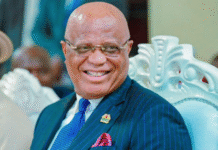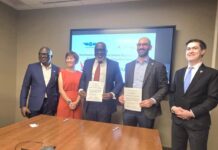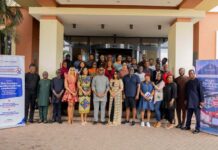Speakers at the second panel session of the 2020 edition of the United Bank for Africa (UBA) African Day Conversations have stated that the development of homegrown solutions and adequate investment in human capacity building and agricultural expansion will rebuild Africa and make it stronger post Covid-19.
Held under the theme ‘Domestic Policies, Regional Development and a Global Agenda: SDGs and African Development at Crossroads; the speakers collectively gave this submission during the second panel session of the 2020 edition of United Bank for Africa (UBA) African Day Conversations, the virtual session moderated by media consultant, Mrs. Eugenia Abu.
The discussants included the regional chief executive of UBA West Africa, Abiola Bawuah (Ghana); senior programme coordinator, Regional Network of Agricultural Policy Research Institutes, Dr Nalishebo Meebelo (Zambia); leadership coach and chairman, Go Ahead Africa Ltd, Roland Kwemain (Cameroon); founder and executive director, Social Change Factory, Sobel Aziz Ngom (Senegal); special assistant to the President Muhammadu Buhari on digital and new media, Tolu Ogunlesi (Nigeria) and social entrepreneur and founder, LEAP Africa, Ndidi Nwuneli (Nigeria).
Bauwah who emphasized how Africa should rely less on foreign donors listed five areas to work on to reach the SDG goals.
They are the private sector, rapid industrialisation, institutions and the rule of law, development of human capital and removal of barriers across Africa.
“We should institute Africapitalism which is an economic philosophy that says that the human and capital resources of Africa are the only ways in which we can develop Africa.”
Meebelo noted that there is a lot that young people can do along the value chain of manufacturing, transporting, technology and marketing.
“Government cannot do it alone; they need to work with other stakeholders. Cut and paste solutions do not work for us here in Africa, we need to have our own homegrown solutions to fight this pandemic.”
The moderator who focused on the role women and youth should play in rebuilding the continent, said Africa has to work together to provide solutions to its numerous challenges.
“Women, entrepreneurial champions, young people and collaborations between African countries are very key to developing Africa,” she stated.
Nwuneli express sadness that the agricultural sector had remained hugely untapped.
She emphasised the need for a change of mindset in which people usually equates agriculture with poverty.
“This is a $1 trillion industry and we are neglecting it; therefore my charge to you is that we invest in the agricultural sector, prioritize it, leverage it, transform our educational system to prepare our young people for this sector, change the mindset and trade with each other,” she said.
Ngom pointed out the need for the youth to take charge in Africa.
“It is time to not just serve young people, but to trust them to lead. The challenge that we have at the domestic and continental levels is making the change in our structure and in the political system that give the place to young people to be 100% engaged,” Ngom stated.
In his contribution, Ogunlesi said young people the young people all over African countries had begun to use the available opportunities.
“We need to start thinking about how to make sure that this is not just for the age of COVID but for now and beyond COVID-19. Even if the pandemic was to disappear today, I hope that the lessons we’re learning, we’re not going to forget them and go back to where we used to be.”
For Kwemain, more institutions need to tow the line of UBA in events such as UBA Africa Conversations.
“If 100 multinationals in Africa were doing that UBA is doing, we would go far because CSR is an amazing leverage not just for the brand but also for supporting people & women in terms of activities. The truth is that we need partnership between the government, corporates and the civil society,” he said.






















































